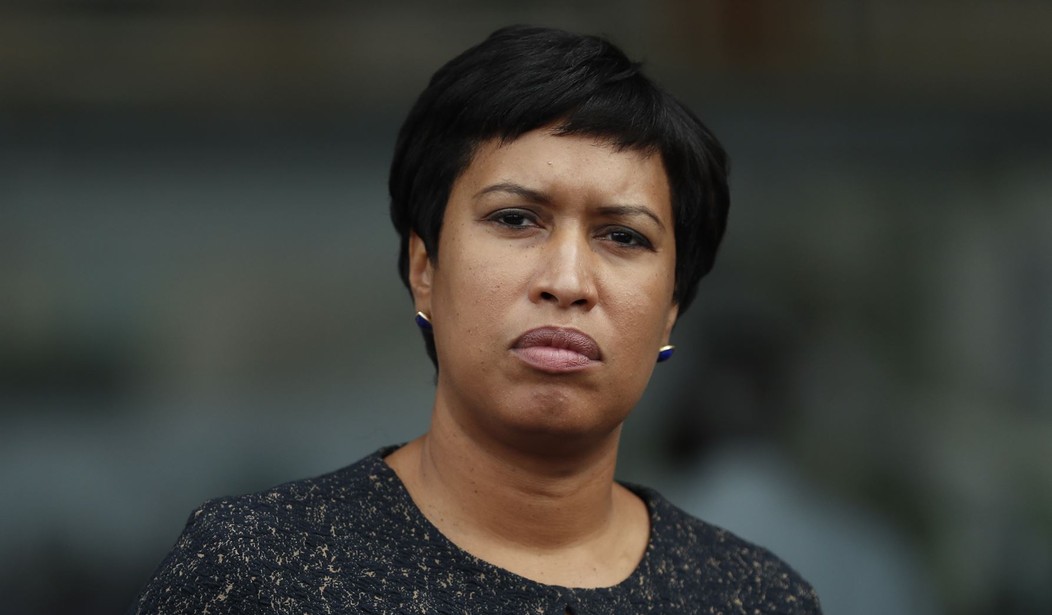Children can learn. Schools can possibly assist in that endeavor.
Keep these two vital precepts in mind when considering the long-term failure of our nation’s capital’s public schools to equip their graduates with the skills necessary for a decent future.
Last week, Washington, D.C. Mayor Muriel Bowser, with city education officialdom in tow, announced some small improvement in standardized test schools city-wide. Yet “little was said at the news conference about the city’s neighborhood high schools,” the Washington Post noticed.
The lapse was understandable, for the Post refers to a fantastic success story back in 2017 — much ballyhooed by D.C. politicians, educators, and experts at the time — whereby the city’s high schools dramatically improved graduation rates. The biggest breakthrough came at Ballou High School, which, despite a particularly high-percentage of students living in poverty, managed not only to graduate every high school senior but also to get every single grad accepted to college.
Finally, the secret educational success formula had been found!
Er, well . . . faked.
It turns out, after an investigation, that administrators and teachers at Ballou and across the city broke the rules — cheated — in order to graduate more students. Young people were passed without completing the required coursework. In many cases, they were graduated after missing a fourth or a third — or even more than half — of the school year.
Numerous teachers told investigators they were pressured by principals to pass students they knew had not earned a passing grade. Almost all the reports were anonymous because the teachers feared retribution — a sure sign of a systemic problem.
Recommended
Of course, some teachers and administrators had won financial bonuses for their fraudulent successes.
What happened to all those high school grads, legitimate or not, who were accepted to college? Even if the process by which it happened was compromised, maybe they were able to nonetheless benefit, eh?
No. That too was a scam.
The University of the District of Columbia automatically accepts any graduate of a D.C. public high school. But that doesn’t mean they can afford to attend or are prepared to do the course-work. In fact, most of the faux-grads had not applied to attend UDC, or ever intended to apply.
Last Spring, as high school graduation time rolled around, the 2018 rate had understandably fallen back down.
At least it was not perceived to be cooked!
Also, last Spring, D.C. high school students took a national standardized test called PARCC (Partnership for Assessment of Readiness for College and Careers). At the last level, before young men and women enroll in an institution of higher learning or embark on a career, the results were less than spectacular.
“About 30 percent of high schoolers passed the English exam in 2018, while 14 percent passed the math one,” noted the Post. Worse results still, “neighborhood high schools that primarily serve students from low-income families . . . recorded decreases in scores or remained stagnant.”
The failures go on and on. At Ballou, the rate of students passing the English portion of the exam plummeted six points; at Calvin Coolidge “fewer than 5 percent of students taking the test passed English, which represented a 10-percentage-point drop from the previous year”; at Ron Brown College Preparatory High, only “1 percent of students passed the math exam.” Some high schools could not even break the 5 percent level for readiness “for college or careers.”
Meanwhile, the Post informed, “Some charter schools that serve large populations of children from low-income families — including KIPP, Thurgood Marshall Academy, Friendship Tech Prep and Washington Leadership Academy — recorded big increases in scores.”
What to do to improve public school outcomes?
Well, Kevin Welner, a professor who heads the National Education Policy Center at the University of Colorado, has an interesting thought: “People want to read into these test scores lessons about what the schools are doing. But these scores, even the growth scores, depend a great deal on students’ opportunities to learn outside of school. If we address the poverty and racism, then we will see these test scores increase.”
Hmmm. Let’s review: (a) the problem is at home and (b) it cannot be overcome by the schools. Moreover, the esteemed professor perceives the cause of these detrimental home environments to be “racism and poverty.”
Once upon a time, public education was proclaimed to be the great equalizer, allowing the disadvantaged to climb the economic ladder, and, if not wipe out poverty completely, to certainly dramatically reduce it.
Now, we discover from an education expert that we had it backwards. We must wipe out poverty, first — and all racism, as well — before poor minority students can have a chance at a decent education.
But wait . . . children can learn.
























Join the conversation as a VIP Member